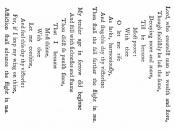On the brink of joining World War I, the United Kingdom set up a draft system to recruit young men into the military. This system set limits on sex, physical disabilities, marital status, and of course, age. Although Edward Thomas fell outside of these restrictions, therefore saving him from ever having to dress in uniform, a patriotic Thomas still wanted to serve his country, so he enlisted. However, before fighting his battles in Europe, Thomas wrote the famous poem, "Rain," in which he discusses the pains of death and war. Thomas creates a speaker with whom he can relate and uses this speaker to represent the possible scenarios and feelings that he may face in any future warlike situations. In "Rain," Thomas' diction, organization, and punctuation all paint intense, disturbing images, which in turn convey the poem's main theme of war and death.
Thomas' diction plays an essential role in reaffirming the poem's main theme.
This is evident in the first lines of the poem when he writes, "Rain, midnight rain, nothing but the wild rain / On this bleak hut, and solitude, and me / Remembering again that I shall die" (1-3). The word "rain" is repeated three times in the first line, initially alone, then with the preceding adjectives "midnight" and "wild." All of these words describe the Thomas' surroundings and symbolize his loneliness. The first "rain" stands alone with no adjective, just as Thomas is alone, while the second and third "rain" are described by midnight and wild, which describe his surroundings and state of mind. These ideas become more obvious in the second line, as Thomas uses the word "solitude," reiterating his aloneness.
In terms of diction, Thomas additionally incorporates several similes into his poem. In line 13, he writes, "Like a cold water among...



THANK YOU SO MUCH!!!
I had to write a poem anthrology as my extended essay!! And one of the poems i had was this one and i couldn't find anything on it!!Thank you so much!! Tish is a real good help!!
0 out of 1 people found this comment useful.